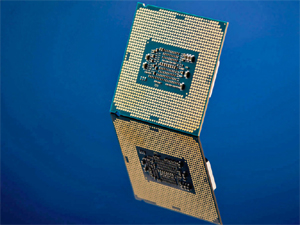



Date:17/08/17
 Intel may be preparing to announce its upcoming eighth-generation processors on August 21st, but the company is already looking to the future with an uncharacteristically early announcement of what seems to be its ninth-generation Ice Lake chips, as reported by AnandTech.
Intel may be preparing to announce its upcoming eighth-generation processors on August 21st, but the company is already looking to the future with an uncharacteristically early announcement of what seems to be its ninth-generation Ice Lake chips, as reported by AnandTech.
I say “seems to be,” because things are a little confusing this time around. Currently, Intel's processors are the Kaby Lake models, which use Intel's second-generation 14nm lithography process. (The company calls it 14nm+.) The upcoming Coffee Lake architecture, which is assumed to be the eighth generation of Intel Core chips, is expected to use the third generation of the 14nm process, or 14nm++. And while Cannon Lake hasn't formally been announced yet, it's said to use Intel's first-generation process on the 10nm scale.
But the recently announced Ice Lake throws a bit of a monkey wrench into things, given that Intel has announced it as the "successor to the 8th generation Intel Core processor family." That would seem to imply it’s some sort of ninth-generation architecture to follow the eighth-generation models. Intel also says that it will use the 10nm+ process, the second generation of the tech at that scale. That could be confusing since it seems like there should be a first-generation 10nm process line as a generation in between.
According to AnandTech, that split is due to the way Cannon Lake's 10nm chips are being grouped together as the Coffee Lake 14nm++ line for laptops at some point in that product generation; desktops will go straight from Kaby Lake’s 14nm+ to Coffee Lake’s 14nm++ to Ice Lake's 10nm+ technology. While we don't entirely know why Intel would split up the laptop and desktop lines, AnandTech has some speculation related to the more technical aspects of the chip design process, which I’d recommend for a read.
That said, given that Intel hasn’t even announced the eighth-generation line of processors yet, it’s probably still a little early to be looking so far ahead to Ice Lake (which probably won’t ship on actual devices until sometime in 2019, at the absolute earliest). But because Intel is usually quiet about its plans for future generations of products, this early glimpse is still an interesting look at what to expect from the processor powerhouse going forward.
Intel announces its next-generation Ice Lake chips unexpectedly early
 Intel may be preparing to announce its upcoming eighth-generation processors on August 21st, but the company is already looking to the future with an uncharacteristically early announcement of what seems to be its ninth-generation Ice Lake chips, as reported by AnandTech.
Intel may be preparing to announce its upcoming eighth-generation processors on August 21st, but the company is already looking to the future with an uncharacteristically early announcement of what seems to be its ninth-generation Ice Lake chips, as reported by AnandTech.I say “seems to be,” because things are a little confusing this time around. Currently, Intel's processors are the Kaby Lake models, which use Intel's second-generation 14nm lithography process. (The company calls it 14nm+.) The upcoming Coffee Lake architecture, which is assumed to be the eighth generation of Intel Core chips, is expected to use the third generation of the 14nm process, or 14nm++. And while Cannon Lake hasn't formally been announced yet, it's said to use Intel's first-generation process on the 10nm scale.
But the recently announced Ice Lake throws a bit of a monkey wrench into things, given that Intel has announced it as the "successor to the 8th generation Intel Core processor family." That would seem to imply it’s some sort of ninth-generation architecture to follow the eighth-generation models. Intel also says that it will use the 10nm+ process, the second generation of the tech at that scale. That could be confusing since it seems like there should be a first-generation 10nm process line as a generation in between.
According to AnandTech, that split is due to the way Cannon Lake's 10nm chips are being grouped together as the Coffee Lake 14nm++ line for laptops at some point in that product generation; desktops will go straight from Kaby Lake’s 14nm+ to Coffee Lake’s 14nm++ to Ice Lake's 10nm+ technology. While we don't entirely know why Intel would split up the laptop and desktop lines, AnandTech has some speculation related to the more technical aspects of the chip design process, which I’d recommend for a read.
That said, given that Intel hasn’t even announced the eighth-generation line of processors yet, it’s probably still a little early to be looking so far ahead to Ice Lake (which probably won’t ship on actual devices until sometime in 2019, at the absolute earliest). But because Intel is usually quiet about its plans for future generations of products, this early glimpse is still an interesting look at what to expect from the processor powerhouse going forward.
Views: 305
©ictnews.az. All rights reserved.Similar news
- Azerbaijani project to monitor disease via mobile phones
- Innovative educational system to be improved under presidential decree
- NTRC prolongs license of two TV and radio organizations for 6 years
- Azerbaijan establishes e-registry for medicines
- Azerbaijani museum introduces e-guide
- Nar Mobile opens “Nar Dunyasi” sales and service center in Siyazan city
- International conference on custom electronic services held in Baku
- OIC secretary general to attend COMSTECH meeting in Baku
- Azerbaijan develops earthquake warning system
- New law to regulate transition to digital broadcasting in Azerbaijan
- Azerbaijani State Social Protection Fund introduces electronic digital signature
- Intellectual traffic management system in Baku to be commissioned in December
- Tax Ministry of Azerbaijan started receiving video-addresses
- World Bank recommends Azerbaijan to speed up e-service introduction in real estate
- Azerbaijan to shift to electronic registration of real estate





















